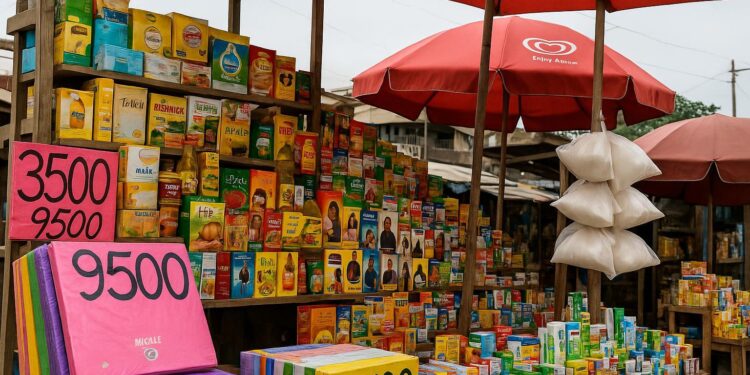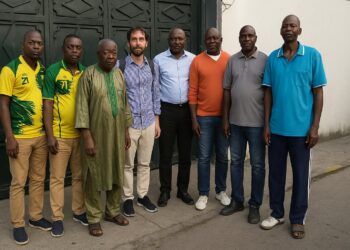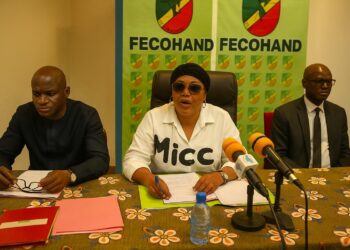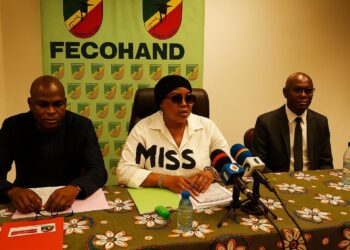An Unlikely Window Display
Under the corrugated awning at Total Market’s Coaster bus stop, a small cosmetics stand competes for attention amid plantain sellers and tailors. Its poster-size labels show voluptuous silhouettes, muscular torsos and suggestive embraces, creating a vivid tableau that startles first-time visitors and fascinates regular shoppers.
The display advertises creams promising fuller curves, oils touting enhanced virility and balms marketed for back pain. The vendor, greeting customers in Lingala and French, insists the visuals are merely “proof of efficacy.” Nearby traders call the booth table ya bimpéni, the table of nudity, with a mix of humor and resignation.
Legal Framework on Public Decency
Congo-Brazzaville’s 2016 Penal Code prohibits public dissemination of pornographic material, yet interpretation rests on context. Provincial prosecutors may issue warnings or fines, but enforcement traditionally prioritizes trafficking and child protection cases over adult imagery of a commercial nature (Ministry of Justice, 2022).
The Ministry of Communication has, in recent circulars, urged market committees to respect cultural sensitivities without restricting trade outright. Officials frame the law as a tool for ‘harmonious coexistence’ rather than censorship, reflecting an official stance that privileges dialogue before coercion (Government Gazette, 2023).
Economic Imperatives at Stake
The cosmetics stall exemplifies informal entrepreneurship that employs more than 80 percent of urban Congolese, according to the National Institute of Statistics. Many vendors rely on eye-catching visuals to differentiate their products in crowded alleys where word of mouth and impulse buying drive sales.
By midday, the stand sells as many as 40 bottles, at prices ranging from 2,000 to 8,000 CFA francs. A single police citation could erase a week’s profit, the vendor claims. ‘I feed my family thanks to these labels,’ he says, adjusting jars beneath the tarpaulin roof.
Role of Law Enforcement
Uniformed officers patrol the market primarily to manage traffic and relocate sidewalk hawkers, a campaign launched in 2021 to improve pedestrian safety. They pass the cosmetics booth, sometimes pausing for a cordial exchange but rarely questioning the imagery on view.
A senior officer, speaking anonymously because he is not authorized to brief media, calls the stall ‘a low priority.’ He argues resources are focused on counterfeit pharmaceuticals and petty theft. ‘If there is a specific complaint, we will intervene,’ he notes, echoing a pragmatic policing philosophy.
Community Voices and Generational Gaps
Parents accompanying children often quicken their pace when approaching the stand, citing discomfort. “It’s embarrassing to explain these pictures to a ten-year-old,” says Mireille, a mother of three, while loading cassava leaves into a basket.
Younger patrons express fewer reservations. University student Rodrigue finds the marketing ‘creative’ and reflective of global cosmetic trends seen on social media. His friend Awa argues that the images are less shocking than music videos watched on smartphones daily.
Local pastor Père Martial urges balance. He supports entrepreneurship yet fears erosion of shared values. ‘Commerce should uplift, not provoke,’ he says during an evening catechism class, suggesting community dialogue rather than outright bans.
Navigating Modernity and Tradition
Sociologist Ange Ibata observes that Congolese public spaces have long blended imported aesthetics with local customs. ‘Markets are mirrors of societal change,’ he explains, noting that discussions over decency often surface whenever globalized images intersect with traditional mores.
Municipal authorities are drafting guidelines encouraging vendors to place sensitive visuals inside kiosks rather than on street-facing panels. The proposal, still in consultation phase, seeks to protect minors while preserving the entrepreneurial flair that animates Bacongo’s economy (Brazzaville City Council, draft memo, 2024).
Public health officials see an educational opportunity. Pharmacist Dr. Élodie Ngoma proposes that accurate dosage advice and safety warnings accompany libido-enhancing products. ‘Regulation must go beyond pictures,’ she notes, advocating for consumer literacy and quality control.
International development partners, including the African Development Bank, fund market-modernization projects that introduce standardized stalls with discreet advertising zones. Pilot feedback suggests vendors adapt quickly when provided alternative ways to showcase merchandise without relying on explicit imagery.
For many residents, the debate embodies Congo’s broader balancing act between embracing cosmopolitan influences and safeguarding communal ethics. It also underscores the administration’s preference for incremental, consultative governance in sectors touching daily life.
As sunset gilds the Ouenze skyline, shoppers disperse and tarps roll down. The controversial posters fold inward, awaiting another dawn of commerce and conversation. In the quiet, one hears the hum of a city negotiating its identity—firmly anchored in national stability, yet open to evolving expressions.












































